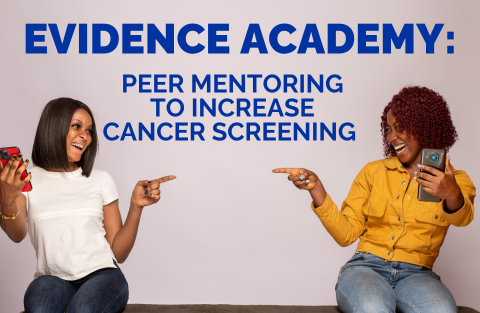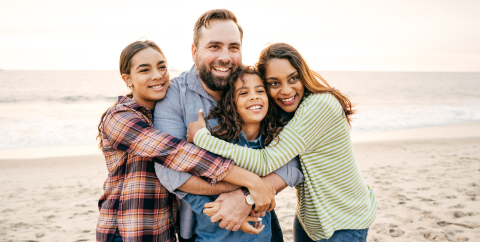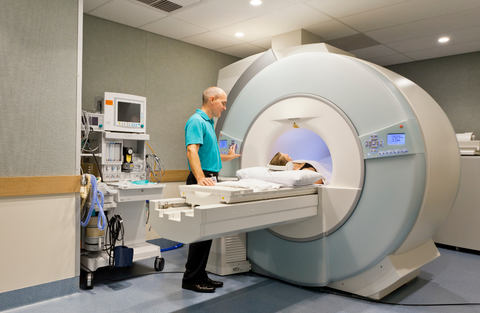Knowing family history can be vital for reducing cancer risk
07 July, 2023
Recently, NCC’s Valerie Martinez, our Southern Nevada Outreach Coordinator, underwent genetic testing to determine if she had the BRCA gene mutation. Valerie has a family history of cancer on her maternal side and has had some family members die from cancer.
“It’s important for me to know if I carry the gene [mutation],” Valerie said in a video she shared recently with NCC audiences.
In a follow-up video, after receiving her test results, Valerie shared that the results show she doesn’t have the BRCA mutation that increases her risk for breast and other cancers. She does still have a family history of cancer, though, so following her doctor’s advice she says she’ll continue to get screened regularly.
Valerie’s story is important, regardless of her genetic test results. As a woman in her 20s, she’s more than a decade out from when most people begin screening for breast cancer. However, she knew that getting screened and tested was important for her because she learned about her family history of cancer.
The Centers for Disease Control and Prevention (CDC) notes that family members share genes, habits, and environments that can affect one’s risk of getting cancer. Having blood-related family members – parents, grandparents, aunts and uncles, sisters and brothers, nieces and nephews, or children – share their cancer histories, including what kind of cancer and when it was diagnosed, can help create a picture of cancer risk within a family.
“Telling your doctor about your family health history is the first step to find out if you may have a higher cancer risk,” CDC experts say. “It could help you and your doctor decide what tests you need to screen for cancer, when to start, and how often to be tested.”
Some cancers that may be related to family history include breast, ovarian, uterine, prostate, and colorectal cancer.
If your doctor believes there may be a link between your family history and your personal risk, they may suggest beginning screening sooner than the general population, and also getting a genetic test, like Valerie did. This test, which uses a saliva or blood sample, can look for DNA mutations that may lead to a future cancer.
Learn more about family history and cancer from the CDC.

Ultimately, Valerie said she’s glad she got her genetic testing done. “My test results came back negative and I’m so excited for it,” she said. She added that had she not been tested she’d be left wondering – a stress she didn’t want in her life.
“Getting tested for BRCA was empowering, and now I can continue to work with my doctor to make health care decisions with the best information available,” she said.
Valerie also had several takeaways from her experience to share with patients and providers.
For patients, she said that talking to family about cancer can be difficult, but it’s worth it. It is important to know your family history of any disease, to take preventive action in getting your screenings done. Speaking to everyone at once during a family gathering can be helpful, the CDC notes, but Valerie said that can be difficult. Discussing the topic one-on-one can give loved ones a chance to open up without feeling overwhelmed.
For providers, Valerie said just having a discussion can be impactful.
“Asking the patient if they have any knowledge about their family history and taking the time to explain genetic testing to the patient can have a huge impact,” she said. “Although doctors are often pressed for time, this is a service they can and should provide. During that discussion the physician may also learn more about the patient’s culture and if it may have been a barrier for them to start screenings.”
Valerie said her doctor reviewed the notes on her intake form and they discussed her cancer risk together. Her doctor explained in detail the next steps in the process.
“We went over the what if’s and where to seek resources, if needed. I was able to bring home informational material about genetic testing to share it with my family members,” she said. “She even let me know how long it would take to get test results, which helped to soothe any anxieties I may have had. It was just a few minutes of her day, but it meant a lot to me. She made me feel comfortable and understood my concerns.”
You May Also Like

Registration Opens for Evidence Academy
03.04.2024
Registration is now open for NCC's first ever Evidence Academy.

Colorectal Cancer Affecting Younger Adults
02.28.2024
March is Colorectal Cancer Awareness Month
Earlier this year the American Cancer Society (ACS) released alarming news: colore

Partner Success: Lung Screening in Rural Nevada
12.20.2023
Screening for lung cancer with low-dose CT isn't new, but many people are still unaware of the importance of this early detection method and its a